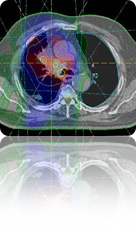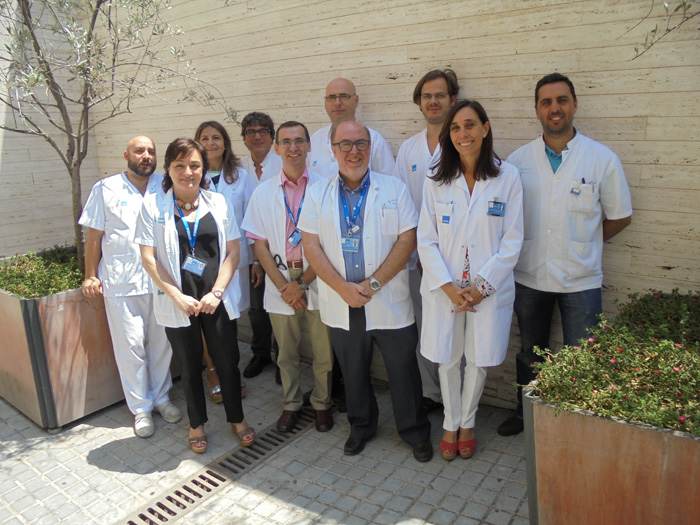
The Radiation and Surgery Research Group is a clinical and basic research group working on the use of radiation as a way of basically treating cancer, especially in the lines of alteration and fractionation, radiotoxicity and quality of life, and to control technological quality and innovation; in addition to clinical projects linked to the clinical activity in the Radiation Oncology Service.
It is a multidisciplinary group comprising medical staff, physicists, technicians and nursing staff. The group has a significant scientific output in relation to Radiation Oncology groups in the area, besides activity to give research visibility.
Its main objective is to maintain the active lines of research, establish synergies with other groups, both national and international, to continue with the group’s training activities and the level of scientific output, and fundraising for both competitive and non-competitive funds, besides increasing its impact in society (popular science, clinical practice guidelines, patient groups and dissemination).
Main lines of research
Fractionation variation and dose escalation
- Study different ways of administering a radiotherapy dose to increase the effectiveness, reduce toxicity or increase efficiency. This group has always stood out for using treatment schemes considered to be innovative, both for palliative and radical treatment.
- We are currently conducting studies with breast cancer patients, with weekly hypofractionated radiotherapy, daily hypofractionation and integrative overage. The goal of these studies is to reduce the overall number of treatment sessions.
- Since 2008, and thanks to a FISS Grant, we are increasing the dose in patients with non-small cell lung cancer so as to improve the results.
- Since 2009 we have an ongoing study to assess the results achieved with accelerated hypofractionated radiotherapy (AHRT) in patients with non-small cell lung cancer.
Radiotoxicity and quality of life.
- Reducing the toxicity derived from treatment and improving the quality of life is the challenge of today’s medicine. The Radiation Oncology Service is experienced in assess radiotoxicity and the quality of life; it has assisted international groups both in the control of oesophageal toxicity in patients with lung cancer, and in the validation of surveys on the quality of life of patients with bone and brain metastasis.
- In 2005, the Catalan Agency for Health Technology Assessment and Research awarded us a Grant to assess the relationship between radiation-induced apoptosis and toxicity in patients with prostate cancer. We were able to demonstrate an inverse relationship between apoptosis and radiation toxicity and survival. Based on this study we were able to establish collaboration with Spanish research groups to assess the relationship between biomarkers and toxicity.
- In this line of research, the PREMER study, Phase III, is currently under way to try and demonstrate that protecting the hippocampus in patients with small cell lung cancer subject to prophylactic cranial irradiation may reduce the neurocognitive side effects attributed to this type of irradiation.
- Also under way is the OPTIMAL study to assess the need for axillary radiation in patients with breast cancer.
- We are participating in the international project STRIPE (“Systematic analysis of toxicity after radical irradiation: pneumonitis and esophagitis”) to assess radiation-induced esophagitis and pneumonitis in patients with lung cancer.
- We are also launching the ReDyOR study “Assessing the benefits of prophylactic rehabilitation of deglutition muscles in the quality of life and deglutition in the short and mid-term, for patients subject to radiotherapy due to head and neck cancer: Randomized Clinical Trial”, which received a grant from the Spanish Association Against Cancer (AECC) in 2014.
Quality and technology control
- This line is complementary to the two previous ones. The addition of new technology very shortly will allow us to go deeper into this line of research.
- We are currently launching a study on the use of 3D printers for brachytherapy and external radiotherapy to reach an even more accurate administration of radiations, with immobilisation systems devised personally for each patient.



